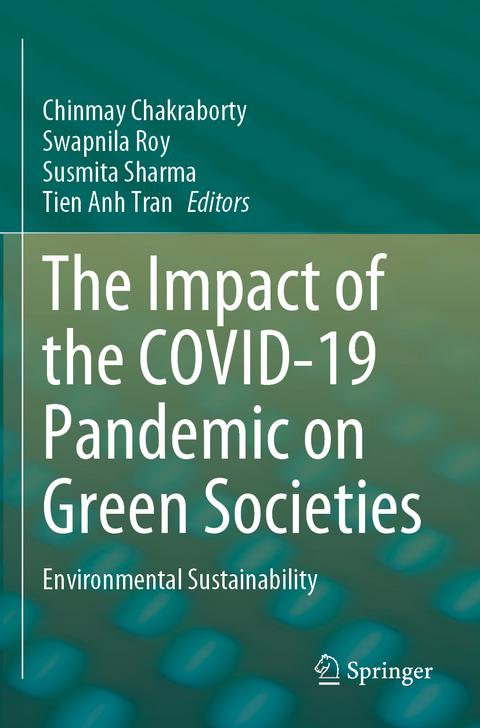
The Impact of the COVID-19 Pandemic on Green Societies
Springer International Publishing (Verlag)
978-3-030-66492-3 (ISBN)
This book covers the sustainability issues of a green environment towards economics and society in terms of alteration in industrial pollution levels, effect of reduced carbon emissions, changes in water bodies characteristics with respect to heavy metal contamination, monitoring of associated impact with respect to ecology and biodiversity, impact of reduced noise levels and air quality influences on human health, handling and management of biomedical waste. According to WHO, 80% of people living in urban areas are exposed to air exceeding safe limits. The advent of "sustainability in development science has led planners to apply evolving notions of "sustainability to the contemporary debate over how cities and regions should be revitalized, redeveloped, and reformed. Market allocation of resources, sustained levels of growth and consumption, an assumption that natural resources are unlimited and a belief that economic growth will "trickle down to the poor have been its hallmarks. The recent advance technology helps to promote green and clean modern societies continuously. The Internet of things will be playing an important role in the upcoming years in environment protection and sustainable development.
There is a focus on paradigm shift in the sustainable development for the green environment during the period of isolation of COVID-19. This is the moment for the mobilization against the climate crisis. The sudden fall in pollutants and subsequent blue skies signifies a dramatic shift for India and also other affected countries during this period. Fighting climate change requires a collaborative approach between all spheres of society unlike the former. It must heavily redirect resources towards local, sustainable activities, including education, health, sustainable agriculture and circular management of resources. The impact of COVID-19 pandemic which has resulted in the dramatic change in the different aspects of the environment. The global lockdown has led to a rejuvenation of nature, ecosystems, biodiversity. Even urban environments are discovering a degree of peace and serenity, which led to decrease in greenhouse gas emission.
lt;p> Dr. Chinmay Chakraborty is an Assistant Professor (Sr.) in the Department of Electronics and Communication Engineering, BIT Mesra, India. His primary areas of research include Wireless body area network, Internet of Medical Things, Smart City, Green Technology, m-Health/e-health, and Medical imaging. He is leading as a Guest Editors of MDPI, Wiley, Springer, CRC Press and IGI publishers. Dr. Chakraborty is co-editing ten books on Smart IoMT, Green Environmental Solutions, and Sensor Data Analytics with CRC Press, IET, Pan Stanford, and Springer. He has served as a Publicity Chair member at renowned international conferences including IEEE Healthcom, IEEE SP-DLT. He received a Best Session Runner-up Award, Young Research Excellence Award, Global Peer Review Award, Young Faculty Award, and Outstanding Researcher Award.
Chapter 1. COVID-19: An Opportunity for Smart and Sustainable Cities in India.- Chapter 2. Re-assessment of Urban Sustainability and Food Security in the light of COVID-19.- Chapter 3. Disruptive Mobility in pre-and post-COVID times: App-based Shared Mobility in Indian Cities- a Case of Bengaluru.- Chapter 4. Finding the Long-Lost Path: Developing Environmental Awareness through the Pandemic.- Chapter 5. The Dual Impact of Lockdown on Curbing COVID-19 Spread and Rise of Air Quality Index in India.- Chapter 6. Aftermath of Industrial Pollution, Post COVID-19 Quarantine on Environment.- Chapter 7. Covid-19: Disaster or an Opportunity for Environmental Sustainability.- Chapter 8. COVID-19 and its Impact on Carbon Dioxide Emissions.- Chapter 9. Sustainable Attainment of Solar E-waste Recycling concerning to COVID-19 Crisis: A Review.- Chapter 10. Impact of Biomedical Waste Management System on Infection Control in the Midst of Covid-19 Pandemic.- Chapter 11. Sludge hygienisation - a novel technology for urban areas to deal with incursion of COVID-19 viral particles in wastewater.- Chapter 12. Trends and Innovations in Biosensors for COVID-19 Detection in Air.- Chapter 13. IoT Based Wearable Healthcare System: Post COVID-19.- Chapter 14. Biodiversity Conservation: An imperial need in combatting pandemic and healthcare emergencies.- Chapter 15. COVID-19 Pandemic: an Unprecedented Blessing for Nature.- Chapter 16. Green Economy Approach to Develop Bioactive Dexamethasone Analogue Scaffold against SARS CoV-2.
| Erscheinungsdatum | 24.03.2022 |
|---|---|
| Zusatzinfo | X, 434 p. 242 illus., 108 illus. in color. |
| Verlagsort | Cham |
| Sprache | englisch |
| Maße | 155 x 235 mm |
| Gewicht | 676 g |
| Themenwelt | Naturwissenschaften ► Biologie ► Ökologie / Naturschutz |
| Naturwissenschaften ► Geowissenschaften | |
| Sozialwissenschaften ► Politik / Verwaltung | |
| Schlagworte | Alteration in Industrial pollution levels • Benefits from socio-economic perspective • Effect of carbon emission during isolation period • Impact in ecology and biodiversity • Impact of noise levels and air quality on human health • Paradigm shift in sustainable development in green environment • Sustainable environmental challenges • Technological advances for societies |
| ISBN-10 | 3-030-66492-9 / 3030664929 |
| ISBN-13 | 978-3-030-66492-3 / 9783030664923 |
| Zustand | Neuware |
| Haben Sie eine Frage zum Produkt? |
aus dem Bereich


